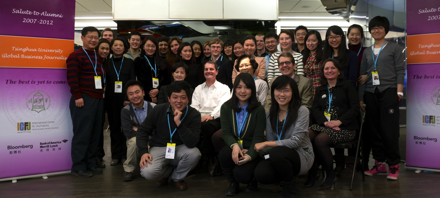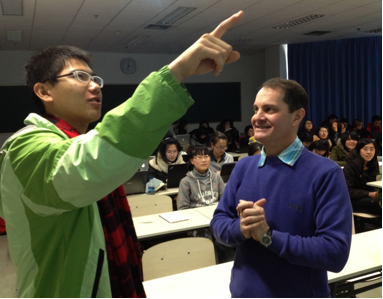
Group photo of Tsinghua University Global Business Journalism Alumni 2007-2012

Professor Miller, teaching Business Journalism at Tsinghua University, is ranked among the top 15 percent of Tsinghua's 4,000 faculty - the highest category - based on student evaluations.
May 8 (On Bloomberg) -- Editor-in-Chief Matthew Winkler spearheaded a groundbreaking project in China when in 2007 he set up a Bloomberg terminal lab at Tsinghua University. He also donated the services of Editor-at-Large Lee Miller, Chart of the Day columnist in Asia Pacific, as a professor at the school known as "the MIT of China."
Winkler's foresight and Miller's efforts have paid off. Tsinghua's Global Business Journalism (GBJ) program has produced more than graduates with master's degrees - two of whom joined Bloomberg's Beijing bureau since 2011: Penny Peng and Stephen Tan. Together, the two graduates and their professor helped establish the GBJ Alumni Association, which had its second event in April.
At the inaugural alumni event - a New Year's party held in Bloomberg's bureau - Stephen Tan was appointed as chief representative of the association, an official position in China's hierarchy. And on the news beat, Tan and Peng joked that while reporting on the recent National People's Congress, they kept bumping into former classmates, including Miao Han, a Bloomberg intern in 2010 and now a reporter for the official Xinhua News Agency. “GBJ graduates are all over the place, and their skills, regardless of where they work, have been strengthened by terminal training and understanding `The Bloomberg Way,'" says Peng. "Mr. Winkler and Professor Miller have created a professional network not only in China but across the world."
Indeed, when GBJ alumna Chen Yingying moved to Kenya earlier this year to work for Xinhua News in Nairobi, she e-mailed her professor to ask if he could arrange a meeting with Bloomberg staff. Miller messaged Kenya Bureau Chief Paul Richardson, who quickly reached out so a reporter for China's official news agency could feel the hospitality of the Bloomberg network.
Miller, who joined Bloomberg in 1991, has taught courses on corporate strategies, news writing, and ethics. His Data Mining for Journalists class echoes his main newsroom responsibilities -- helming the Chart of the Day. His column on boardroom diversity was chosen as BN's chart of the year in 2012.
Although GBJ is a master's program, Miller's popularity earned him an invitation starting in 2011 to teach freshmen at China's No. 1 university -- no small feat for an American, given that President Xi Jinping and his predecessor Hu Jintao are both Tsinghua graduates. Miller is ranked among the top 15 percent of Tsinghua's 4,000 faculty -- the highest category -- based on student evaluations.
The GBJ program in Beijing is jointly managed by Tsinghua and the Washington-based International Center for Journalists, of which Winkler is a board member. Bank of America is also a founding sponsor. GBJ students have also had lectures by Peter Grauer and Norman Pearlstine.
GBJ Graduates aren't only from China. The program has also educated would-be journalists from Brazil, South Africa, Pakistan, the U.S., New Zealand, Russia, Eritrea, Costa Rica, Myanmar, and Lebanon. A global program, indeed.